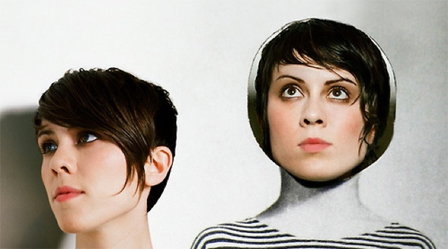Erstellt am: 2. 7. 2010 - 16:53 Uhr
Lilith Fair
by Susan Valot
Susan Valot is a Southern California native who grew up in the South Bay. She's a graduate of Cal State Fullerton. She has won numerous journalism awards including a Golden Mike from the Radio and Television News Association of Southern California.
Imagine if you were a woman who applied for a job, but were told, “We’re sorry, but we already have a couple of women working here. We can’t take on any more. That might scare our customers away.” Seems absurd, doesn’t it? But that is what Canadian singer Sarah McLachlan ran into when she wanted to tour with another female artist, Paula Cole, in the 1990s.
“She was told that, in fact, no, she couldn’t, she shouldn’t tour with Paula Cole because that was two women on the bill and no one wanted to come see two women on a bill,” says Oregon State University history professor Mina Carson, co-author of the book, “Girls Rock!: Fifty Years of Women Making Music.
“And she (McLachlan) said, ‘Why not?’ And they go, ‘Well, just because. You know, one woman on a bill. That’s how it’s done.’ And she persisted and she and Cole toured together and, you know, it was fine. But she thought, ‘This is just wrong,’” says Carson.
So McLachlan set out to create a music festival to change that: Lilith Fair. It’s a festival composed of all female soloists and female-led bands that toured North America from 1997 to 1999. It took a nearly decade-long break.
But now Lilith is back, bringing female singers and bands to the United States and Canada this summer. Lilith reportedly will also make a quick tour of Europe sometime this year.
Carson says women face had an uphill battle in the music industry, but Lilith Fair is one of the factors that’s helped to change that.
“Lilith Fair, I think, has really shown that you can have more than one woman in a place and everything is going to be all right. You know, you can have a whole grocery store full of women artists and it doesn’t mean that the whole record label is going to fold,” Carson says.
She says women’s music festivals aren’t new. They’ve been around for decades. But traditionally, Carson says a lot of people have considered them lesbian festivals, dubbed the “women’s music” movement in the 1970s. Carson says Lilith Fair made women’s music more mainstream, attracting mostly women – but also some men – to the concerts.
“It just felt different. It wasn’t like other concerts they had been to, which were SO, felt SO male-dominated. You know, the audience felt male-dominated and sort of macho and a little rough. Women often felt just a little bit, just on edge, on guard because the music was sexualized and the women were in the minority and so on,” Carson says. “Whereas these concerts (Lilith Fair), women are in the majority in the audience and they can create that – you know, it sounds silly – but they can create that one-to-one connection and you SEE that. And it’s SO exciting!”
Carson says Lilith changed the world by opening the door to imagination and new artists – women who rock. This year’s festival includes nearly 100 artists, including FM4 regulars, like Tegan and Sara, Gossip, Cat Power and La Roux.
Reality Check Festival Special:
Saturday, 3rd July
12-13h
A Reality Check Festival Special.
This year marks the 40th anniversary of the Glastonbury Festival in England, the largest open-air music festival in the world. So we’re taking a look at festivals with a story to tell. From heavy metal in the Middle East to love, peace and music in the Mali desert , to a women’s music festival in the US, we hear how worlds are rocked by this ancient ritual of people coming together to celebrate music.
You can hear more about them in the Reality Check podcast after the show.



